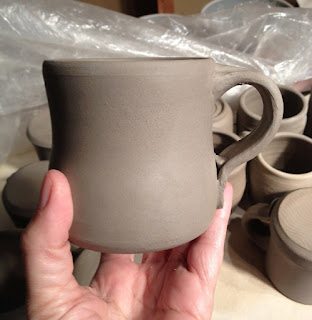The Story of the Handle Man:
Why practice based research?
As a student of ceramics in the 1980’s we had a
field trip around a pottery factory in Stoke on Trent. The ceramics industry
was in terminal decline, yet in Stoke, the majority of the jobs were in the potteries
and peripheral industries serving the factories. To such an extent that the whole
of Stoke had Potters Holiday in June, the whole place closed down. In this
factory we saw skilled mould makers, arcane jigger and jollying work making dishes,
expert engravers cutting copper plates to print willow pattern from, women whose
sole job was banding 24 ct gold on the rims of flatware.
What most fascinated me was the handle man. Standing
in front of an 8 foot rotating rack full of teacups, he unhinged a plaster mould,
popped out a dozen or so cast, green, handles and attached them to the teacups so precisely,
so neatly, so perfectly and so fast that after every twelve handles he gave himself
the treat of a cigarette, which he could
smoke at his ease as he had made up so much time. I think when Sennett (2008)
was talking about mastery, it was as part of a progression of states, and
although this handle man was a master at attaching the handle – that is all he
was master of. An isolated part of a larger whole that he never completed. Repetition
is only one part of mastery, as Sennett says after repetition, comes the
innovation, the divergence, the transcendency. Creating something never seen,
thought or touched before.
This accomplished handle man’s task became more
real to me a few years later when I took up the post of potter’s apprentice in
North Carolina. A five year journey of repetition, observation and emulation.
After completing my undergraduate studies, I thought I had a ‘handle’ on what
it was to be a potter, but I had no I idea.
Sennett (2008) says
that we need craft work as a way to keep ourselves rooted in material reality,
providing a steadying balance in a world which overrates mental facility.
(Hyland 2018) States that acting in and on the world brings
about knowledge and understanding; and the sharp divisions between knowing how
and knowing becomes redundant. The physical world cannot be separated from our
subjective conscious experience, through bodily sense perception.
As part of my job at Bob’s Village Pottery I was
tasked with attaching handles to many items such as casserole dishes, mixing
bowls, jugs and hundreds of thousands of mugs, steins and cups. Bob was the
master potter, he would throw two hundred and fifty mugs on a good day, and
after firming up overnight I would stand at the sink with a knife, a bowl of
water and a sponge and attach 250 handles. It would take the whole day and when
I first started it would take a day and a half. This is real acting on the
world, making something tangible and useful, after a while, the movements and
my body became a handle attaching machine, automatic of my thoughts and I was
free in my mind to drift and wander. As Merleau-Ponty (2013), put it I became the
embodied subject and as Bhor (1989) states, we construct the world by observing it.
In a very real way my construction of the mugs
allowed me time for reflection and connection, the clay, the water, my hands, the
action of attaching the handle. When else would I have a whole day to stand and
think, to contemplate the beauty of repetition? Of the very slight variations
in the mugs that made them hand thrown rather than slip-cast and factory made. The
satisfaction of making something good, whole, useful, not just one but
hundreds, lined upside-down on boards of 20, each completed board a great gratification,
weighing pounds, pleasing to heft the heavy board and enter the damp coolness
of the drying room. Hyland says that craft challenges the mind body dichotomy.
Good craft cannot be made without thinking and the design process being engaged
(Norton, 2012) divergence and innovation conflated with analysis, thinking
through more doing and rethinking. Practice based knowledge is striking in its multilayered complexity of philosophical thought.
Merleau-Ponty,
M (2013) Phenomenology of Perception, London
and New York, Routledge – Taylor and Francis Group.
Murdoch, D. R., (1989), Niels Bohr, N.,
(1989) Philosophy of Physics, New
Zealand, University of Caterbury.
Hyland, T., (2018) ETF, MPhil residential conference,
Sunderland University.
Norton, F., (2012) LSIS report, Access
All Areas, a research project on Curriculum development in FE, Access art
and design, published in the LSIS online Journal, University of Sunderland.
Sennett, R.
(2008). The Craftsman. London,
Penguin.
Image: Continuing on the Potter’s
Wheel with Iris Bedford Peterson, http://www.breckcreate.org/event/throwing-potters-wheel-iris-bedford-peterson-3/
accessed 26/02/18




Comments
Post a Comment